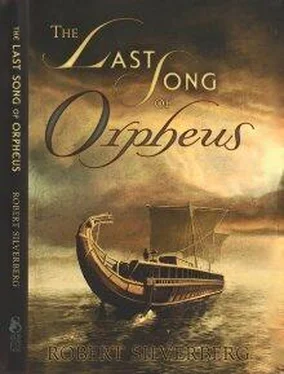Jason was taken before Pelias, and boldly—or, one might say, foolishly—told him that the name he bore was one that his foster-father Cheiron had given him, but before he was Jason he had been Diomedes, son of King Aeson. He demanded that Pelias step down from the throne, as he had sworn to do long ago; and the deceitful Pelias, pretending great love for his brother and his brother’s son, replied without hesitation that he would, but on one condition.
“And what may that be?” asked Jason.
“This land is under the curse of our kinsman Phrixus, whose spirit wanders unhallowed in Colchis. An oracle has told me that there will be no peace for our family until he is returned to the city of his birth, and that must be done only in a certain way. Therefore build a ship and sail to Colchis, and bring the ghost of Phrixus home to Iolcus aboard that ship, and bring with it the fleece of the golden ram that had carried him as a fugitive to Colchis before you were born.”
That seemed to Pelias the perfect way to rid himself of Jason; for the sea voyage to Colchis was so fraught with perils that it was almost impossible to survive, and in any event stealing the Golden Fleece from under the baleful glare of that unsleeping dragon was something that no one could achieve. But Jason, as I have said twice now, was a great fool, though a brave man, and he set out forthwith to build the ship and bring Phrixus and the fleece home from Colchis.
Whereupon Cheiron the centaur came to me in Thrace and told me that I was essential to the success of Jason’s voyage, and I yielded to the inevitability of the gods’ decree, and so my involvement with Jason and his Argonauts began.
“Argonauts,” we were called, because the name of our craft was Argo , and that in honor of Argus of Thespiae, who with the help of Athena built that great vessel at Pagasae on the Magnesian coast in Thessaly just east of Iolcus. It was a splendid ship. None so grand had ever been built before, and not until long after our times would its equal be seen on the seas. A well-balanced fifty-oared galley, it was, slender and graceful, built for speed, with a keel and frame of oak and planks of pine brought from the forested slopes of Mount Pelion, all of them fastened in place with bronze nails and caulked with tar. A sturdy mast of fir that would soar far over our heads was nearing completion when I arrived at Pasagae. The bottom had already been finished and the close-set ribs were rising, but I watched that great shipwright put in the long side-planking and construct the half-decks, and fence the hull about with a latticed bulwark to keep the water out, and build a broad oar to steer her with, and fashion a wondrous square sail out of the white linen cloth of Egypt to cling to that mighty mast. For her prow Argus took a great beam from the roof of the royal palace in Iolcus that had come from Zeus’ sacred grove in Dodona.
The sound of hammering went on day and night. The magnificent vessel, with timbers painted blue and gold and crimson, came rapidly toward completion; and meanwhile the band of heroes who would take her to Colchis was assembling, summoned from far and wide at Jason’s behest.
Such a group of voyagers had never been brought together before. Heracles himself was among us, that giant among men, and Peleus, the father of Achilles, and Odysseus’ father Laertes. A phalanx of sons of trident-wielding Poseidon would be aboard: Ancaeus of Tegea, Erginus of Miletus, Melampus of Pylos, Nauplius of Argos. It is always good to have sons of Poseidon among one’s shipmates, for the sea-god will look after them and their companions. Nor were the other Olympian gods unrepresented, for also we had bronze-helmed Ares’ son Ascalaphus of Orchomenus, Hermes’ son Echion of Mount Cyllene and also his guileful brother Erytus, and Idmon the Argive, Apollo’s son. Heracles, as everyone knows, was begotten by Father Zeus, and with us as well were two more of Zeus’s get, Castor of Sparta and his brother, the invincible boxer Polydeuces. Then there were winged Zetes and Calais, the sons of the north wind Boreas. We would have had famed Theseus with us too, another hero of Poseidon’s making, but a different task detained him at the time. You will find in the writings of the poets who wrote of our journey in the years afterward the names of many others also, hundreds of them all told, who are said to have sailed aboard the Argo , for every city has its poet and what city would not have wanted to claim its share of that fabled voyage? But I assure you that our ship had but fifty oars. I will not list all the others who actually did go with us: suffice it to say it was an extraordinary gathering of men, and even one woman, Atalanta the long-legged virgin huntress, whose beauty and swiftness of foot impelled Jason to include her in our group.
It will not surprise you to hear that such a band of proud heroes might be inclined toward quarrelsomeness, especially when wine had been flowing quickly; and so, very shortly, it was made clear to me why the gods had chosen me to accompany them. For only through the calming influence of song could these headstrong and boisterous men be made to remain at peace with one another.
They were fighting among themselves on the beach at Pagasae when I first came among them. Our captain Jason, for all his strength and valor, and he was richly endowed with both, was a brooding indecisive man. He had been lost in some somber meditation on the wisdom of undertaking the voyage when Idas of Messene drunkenly accused him of cowardice, and then loudly bragged that even if all-seeing Zeus himself sent misfortune to the Argo , Idas would fend it off. Idmon, who was one who laid claim to having been engendered by Apollo, took offense at this boastfulness, and berated Idas for it, as did Polydeuces the boxer, who knocked Idas down when Idas angrily brandished his spear. Then Lynceus, the brother of Idas, came running up, sword in hand, to take his brother’s part, and chaos and bloodshed threatened.
It was at this moment that I made my appearance in their midst. Brooding, anguished Jason caught me by the wrist and said, “Orpheus! By the gods, you come to us at a welcome time! You who can lure oak trees out of the forest and down to the seashore by the sound of your lyre, quickly play a melody that will soothe these madmen before we are all lost.”
So that is what he thought, that I have lured oak trees from the forest to the seashore with my music? Well, people think many things of me. I do not confirm them; neither will I deny them. But most assuredly I know the art of calming angry men. So I unslung my lyre and whacked its sounding-board with my hand to get their attention, and struck a chord or two, and began to sing the first song that came to my lips.
What I sang was the song of the Creation, the song of that time before time when there was neither light nor darkness, but only the primordial dimness, and sky and earth and sea all were one. I sang of how they struggled mightily among themselves, each yearning to escape the others’ grip, until a forceful music arose out of the heart of the universe and they were sundered by it. I sang of the stars in the heavens, and how they travel their appointed courses, each making its own sweet sound as it moves, thereby bringing forth wonderful music as they sail above us, the great song of the cosmos. I sang of the primordial oneness of water and earth, out of which came Phanes, the creator of all, from whom the cosmos had its first origin. I told of how Phanes made the sun and the moon, and the first men, too, who were not of our race, and have long since vanished from the world. I sang then of how Phanes brought forth a daughter, Night, to whom he handed the supreme power when he grew weary of wielding it, and from whom came Gaia and Uranus, the earth and the heaven. From them, I told, came the race of Titans, Cronos, Rhea, and all the rest; and then I sang of how Cronos overthrew his father Uranus, and by Rhea brought forth the next generation of gods, Zeus and his brothers and sisters, and how there was increasing dissension among them until the cosmos was on the verge of degenerating into discord, until Zeus of the lightning-bolts came forth to overthrow his royal father Cronos and take his place atop snowy Olympus and bring the world under his wise rule. And at last I sang of the swallowing of the world-creator Phanes by Zeus, so that he would encompass all things within himself, both the beginning and the end, and could create all things anew, including the race of men that endures today. I might have sung some other version of the tale entirely, and then a different one from that, for there are many such stories of the succession of the eras of the gods, and no two of them are the same, but all of them are true. The one I sang was the proper one for that occasion. By the time I had reached the point in my song that told of the setting aside of Cronos by Zeus, the restoration of order in the world, and the engulfing of Phanes, the Argonauts had recovered from their fit of madness. The swords were sheathed, the spears were laid aside, and they were dancing drunkenly on the beach, even Jason capering nimbly, his arms over his head, his fingers snapping. And that was the end of it; but I had served my purpose. It would not be the last such time.
Читать дальше












